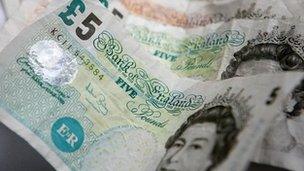Q&A: What the Autumn Statement means for you
- Published

The Chancellor George Osborne has delivered his Autumn Statement, a review of the economy, and government spending and taxes, in between Budgets.
Here are some of the key points that will affect the pound in your pocket.
How will pay for staff in the public sector be affected?
The six million or so public sector staff are in the middle of a pay freeze. For some of them that ends next spring.
However, Mr Osborne has now said that future pay rises will be no more than 1% a year for each of the two years after the pay freeze ends.
He also announced a review, to report next year, into whether or not national pay negotiations and national pay scales in the public sector should be broken down into regional ones.
That would probably mean lower pay for staff outside London and the South East.
How are my state benefits going to be affected?
It was confirmed that the basic state pension will go up by £5.30 to £107.45 a week in April 2012, which Mr Osborne said was its largest cash increase yet.
This is in line with the government's "triple-lock" policy under which state pensions will always rise by the greater of earnings, prices, or 2.5%.
Working-age benefits will definitely be upgraded in line with last September's Consumer Price Index (CPI) inflation rate - 5.2% - quashing suggestions that he might uprate these benefits by a lesser amount.
The basic element of working tax credit was already frozen for next year.
The child element of the child tax credit and the disability elements of tax credits will rise in line with the CPI in 2012-13.
But a planned "over-indexation" in the child element of child tax credit, of £110 above inflation, will not now take place.
Nor will there be any uprating of the couple and lone parent elements of the working tax credit in 2012-13.
Meanwhile the standard minimum income guarantee in the pension credit system will rise by 3.9% in April 2012, to £142.70 per week for single pensioners, and to £217.90 a week for pensioner couples.
What about the state pension age?
The intended increase in the state pension age to 67 has been brought forward by eight years.
The increase from 66 to 67 was due to have started gradually from 2034.
Now this process will start in 2026 and end in 2028.
And that will be just six years after it has gone up from 65 to 66.
The government says this will save about £60bn between 2026-27 and 2035-36.
Anything about taxes?
The government will freeze the annual exempt allowance for capital gains tax.
It will stay at £10,600 for 2012-13.
What about rail fares, fuel duty and transport costs?
Transport for London (TFL) fares and regulated rail fares elsewhere in the UK will be allowed to rise next year by no more than inflation - as measured by the Retail Prices Index (RPI) - plus 1%. Previously fares were set to rise by RPI plus 3%.
Meanwhile planned increases in fuel duty, which would have pushed up petrol prices, have been curtailed.
A rise of 3.02 pence per litre scheduled for 1 January 2012 has been cancelled.
It will come in on 1 August 2012 instead, replacing a planned rise of 1.92 pence per litre originally scheduled for that date.
However, an increase in air passenger duty will go ahead as planned in April 2012. Airlines have calculated it to be a rise of more than 10%.
Did the chancellor say more about his new housing strategy?
Mr Osborne trumpeted a reinvigorated right-to-buy scheme for council and housing association tenants who want to buy the homes they live in.
Discounts for buyers in England will be increased with the government promising to replace each home sold.
This is part of the government's recently announced housing strategy, which included offering mortgage guarantees to lenders.
The aim of these indemnities is to make it easier for lenders to agree mortgages with would-be home buyers who can stump up only a 5% deposit.
Meanwhile the temporary tax relief for first-time buyers will end on 24 March 2012, as planned.
Mr Osborne said it had not been effective in encouraging more buyers.